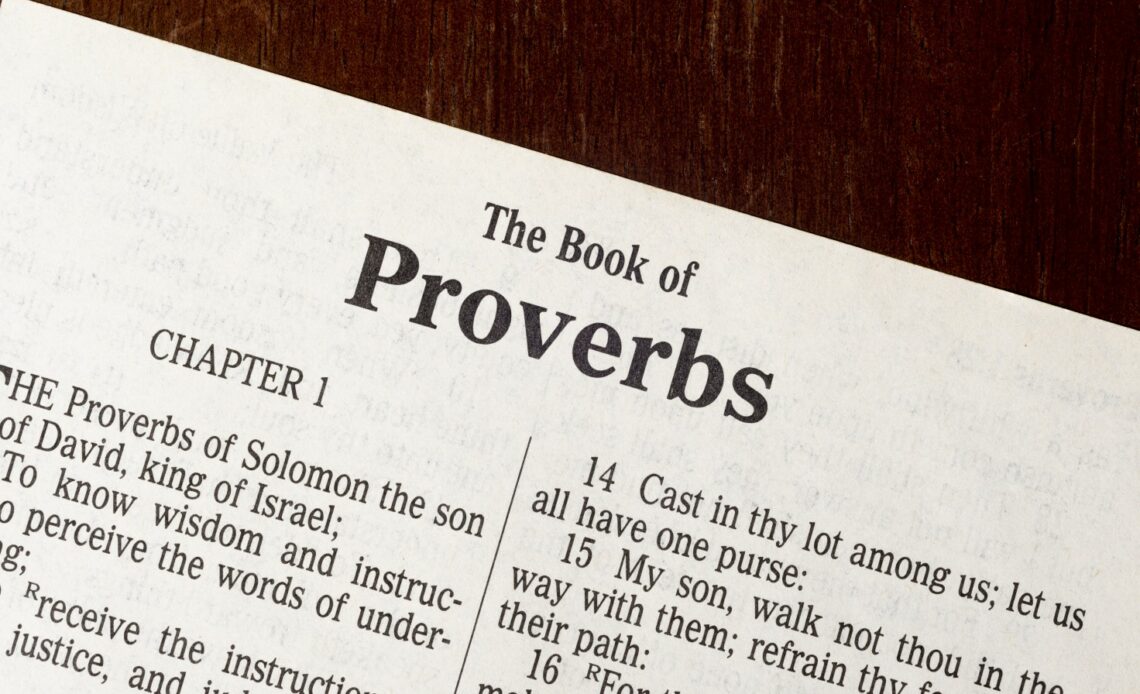Down through the ages, the book of Proverbs has been a rich source of practical application for a believer in whatever area of life he finds himself in.
Topics such as anger, peer pressure/the fear of man, greed, pride, and much more are addressed extensively. Elements of both putting off the old life and putting on the new are unpacked in a machine-gun style through much of the book.
While it may be relatively clear what the purpose of the book of Proverbs is as one delves into its reading, there are still many who have never quite pondered the question. What is the purpose of the book of Proverbs? Understanding the purpose of a book can lead to a greater level of benefit from its reading.
The importance of purposes
The person who knows that the book of Galatians was written to combat a false gospel that added works to Christianity can find help in turning from legalism and trusting in Christ alone for salvation.
The person who knows that the book of John was written so that people may believe in the Son of God will turn to that book to increase his faith and will recommend it to unbelievers to read.
The person who knows that the book of Philippians was written to help the people in the church get along and squash their differences will gain help in finding a way to humble himself like Jesus, thus being a peacemaker in his relationships with others.
Later in this article, the purpose of the Proverbs will be discussed.
The importance of genres
Another important point arises in consideration of the book of Proverbs. The reader who is unfamiliar with the various literary genres used in Scripture can begin to read all the books in the same way. This can create a flawed interpretation of the Scriptures, leading to discouragement and a dull devotional life.
For instance, as one turns to Paul’s writings, he will find very clear teaching. This clear teaching is referred to as the didactic. In it is clear instruction on what is to be done in the believer’s life. This may be why many people enjoy these writings the best. It is not hard to see in them what must be done.
But as this person turns to what is known as a narrative account (Genesis -Esther and Matthew-Acts), he encounters a problem. The instruction is not as clear. This person continues to read, looking for what he would look for as he reads any of the books from Romans through Jude.
But he does not find it, or at least minimally. It is because these narrative/historical accounts are not the same genre. One of the primary benefits to the reader of a historical account is not to keep reading until he finds clear instruction but rather to analyze the many characters that he encounters.
In the Bible, there are two primary ways of teaching: direct instruction and example.

Another problem arises as one reads through the Bible and then turns to the book of Proverbs. In many of the books of the Bible, God gives His people promises.
As a result, when a person begins reading the Proverbs, his tendency may be to read the Proverbs as promises. But this must not be done. As everyone knows, a gentle answer does not always turn away wrath (Prov. 15:1).
But how can this be said in God’s Word if it is not a promise or is not always true? Wouldn’t that make God’s Word false? Well, it would make God’s Word false if God intended it to be a promise or an absolute truth. However, God intended it to be a general truth.
The book of Proverbs is filled with what are known as general truths. These “general truths” are true most of the time but are not always the case. (Times will arise when a person may continue in his anger despite someone speaking to him gently.)
The importance of conjunctions
Another helpful tip in reading through the book of Proverbs is to take note of what are known as conjunctions. Conjunctions link to thoughts and reveal a purpose behind what is being said.
For instance, throughout the Scripture, the words “so that” are used. This reveals that what is said after the words “so that” gives a purpose to what was said prior.
In the Proverbs, two conjunctions are used frequently. The words “and” and “but” are used numerous times. The word “and” is a comparative conjunction and reveals that what is said before the word “and” is being compared to what is said after.
Oftentimes in the book of Proverbs, the reader will see this play out as a second line expounds or elaborates on a previous line.
The word “but” works as a contrasting conjunction. It is the opposite of the “and” conjunction. When the word “but” is used, what is said before the word “but” is being contrasted with what is said after the word “but.”
Oftentimes, this will be competing statements that will appear as opposites.
This brings us to a quick overview of the book of Proverbs and its purpose.
Purpose #1 – To know wisdom and instruction
Scripture says, “To know wisdom and instruction…” (Prov. 1:2). First, Solomon informed his readers that the writings within the book of Proverbs are written so that you would know wisdom and instruction.
To know wisdom is to know how to walk out your faith. Wisdom is the practical application of knowledge. Instruction has to do with discipline, and this word elsewhere is translated as chastisement. It involves a warning on how to live and implications if you do not heed the warning.
Purpose #2 – To perceive words of understanding
Scripture says, “To perceive the words of understanding” (Prov. 1:2). To perceive, simply put, means to know. Therefore, Solomon wanted his readers to know understanding or to know how to understand.
Understanding, while incorporating the word knowledge in its definition, is also different from a simple form of knowledge. It involves a depth to what is known, and it will lead to a conviction in the heart of man. For a man who truly understands that Jesus died for him, it will result in a radical transformation.
Purpose #3 – To receive instruction of wisdom, justice, judgment, and equity

Scripture says, “To receive instruction of wisdom, justice, and judgment, and equity” (Prov. 1:3).
Solomon continues by expressing his desire that his readers would live a disciplined life in the areas of wisdom (the practical application of knowledge), justice (righteous living), judgment (to have right thoughts and verdicts about the world and those around you), and equity (to prosper on the way; to walk the straight path).
Purpose #4 – To continually develop a believer into maturity
Scripture says, “To give subtilty to the simple, To the young man knowledge and discretion. A wise man will hear, and will increase learning; And a man of understanding shall attain unto wise counsels” (Prov. 1:4-5).
As Solomon brings his purpose to a close, he does so by highlighting the simple, the young man, the wise man, and the man of understanding. In doing so, Solomon makes it clear that his book is for everyone and can be used to meet every individual where he is at.
It is not just the learned who will reap the benefits of reading this book, nor is it only the fool who can read Solomon’s work and turn from his foolish ways.
Rather, in each and every life, the book of Proverbs can be used as a helpful and faithful guide to the Pilgrim who is searching for the Celestial City. It can even be used to lead people to a place of repentance as they are sternly warned about where the course of their life will lead them.
Final prayer
Father, I thank You for the book of Proverbs. I thank You that You cared enough about me to leave me with helpful advice on how to live my life. Help me to heed Your instruction and to grow in wisdom. In Jesus’ name, Amen.


